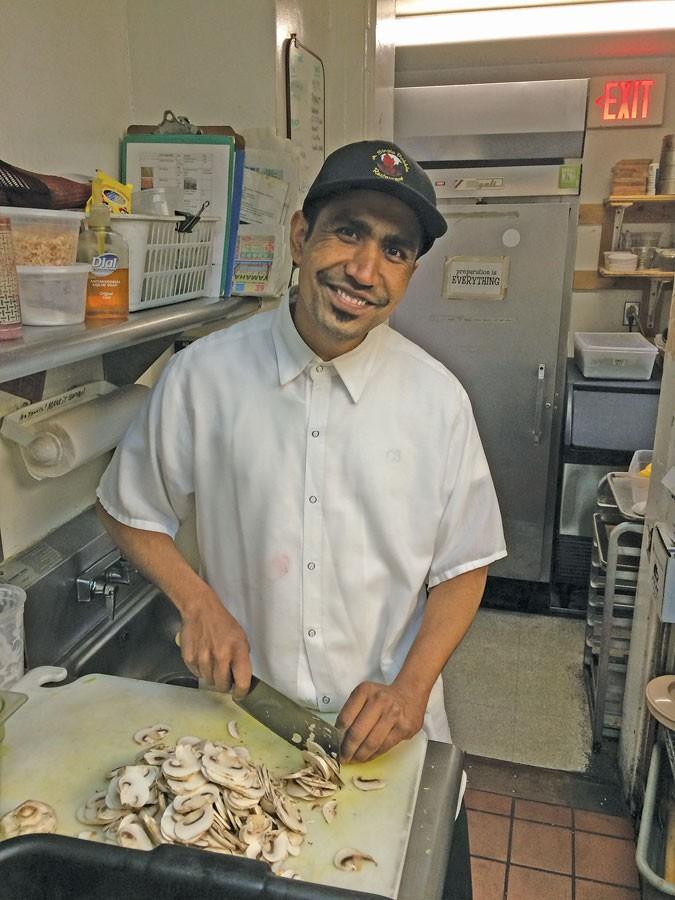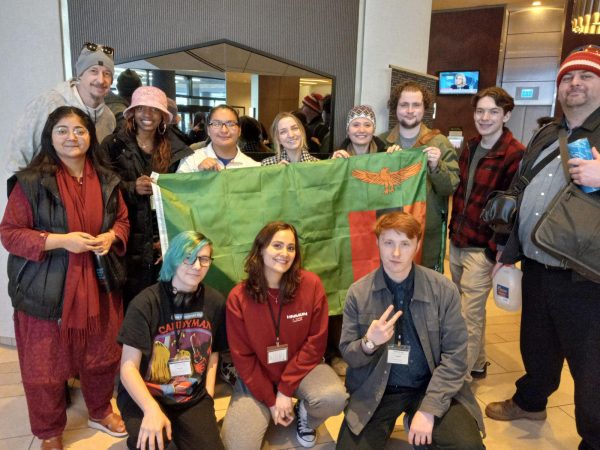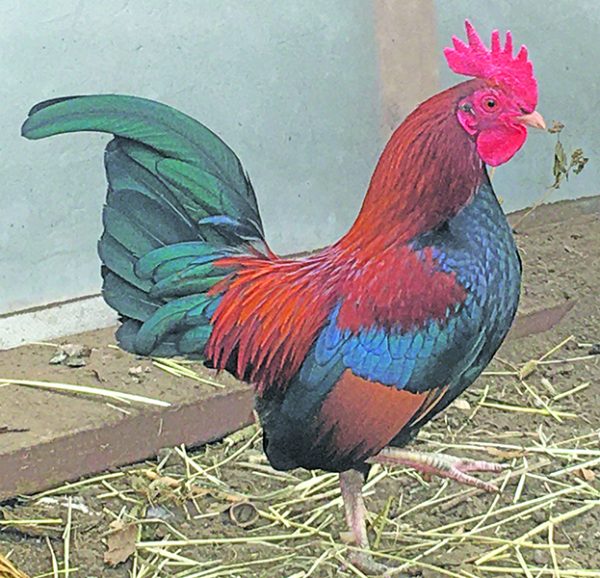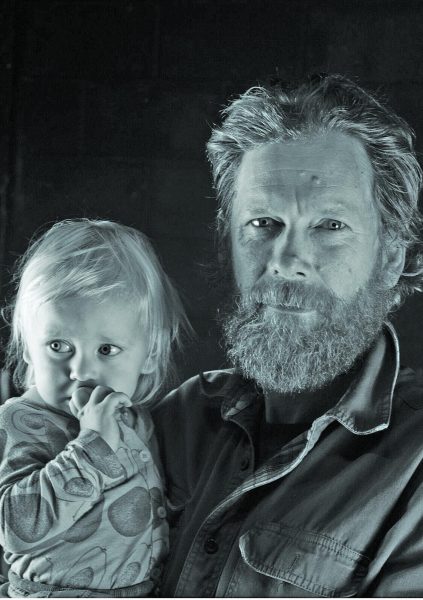The language of a restaurant: How I became aware of the Nepalese
The head-chef Charles- father, lacrosse coach, marathon runner and Dead-head calls out the ticket: “garlic broccoli, two pork potstickers, peking duck, two soups, lo-mein, tangerine chicken” Ben, a tattooed, Lego fanatic stands two wok’s away from me. He yells: “Om, mixed greens! Red peppers! Batter!” The clang of woks has a sound like tinny, uneven gongs, hit fast over and over and over by upset baby gods. The 2-foot, 700-degree flame underneath them propels and sounds like a little get engine. “And raw broccoli, Om.” I add as I throw the last bowl raw crowns into the fryer.
Om walks briskly, almost running. “Ok, broccoli, ” he says in his accent. He is the only one in the kitchen who has brown skin, except for the dishwashers who share the same Nepalese ethnicity.
Their melodic contribution is a mixture of hose spraying, plates chattering, silverware clinking, their mouths moving in the Nepali language. They’re big fans of singing too.
For the past two years, I’ve worked at a popular Chinese restaurant in Burlington, where I flip and toss a wok to cook in the Cantonese style. I use spices and methods that were once foreign to me.
However, the cultural blending that is most apparent is not that of the food, but that of the faces who make up the kitchen/dishwasher staff. Before this job, I didn’t know the prevalence or existence of the Nepalese/Bhutanese population in my city.
I didn’t know that about 1800 Nepali-speaking Bhutanese have resettled here after living in refugee camps for up to 20 years. I didn’t know that some of the dishwashers who sing among the clatter of dirty plates and chopsticks have spent much of their life rationing food and living without electricity. I didn’t know that their language and Hindu dress was outlawed in Bhutan halfway through their childhood, or that the ruling Buddhist class forced them out. I didn’t know their families were threatened. I didn’t know that they came here in search of a better life.
Everyday I’m hit with “Hi, Travis” a handful of times, on account of our cultural norm, say hi to your coworkers. The most astounding and buoyant greeting is when Bishnu, a Nepalese dishwasher enters from the outside world via a squeaky screen door located at the back of the restaurant. The outside is a quaint cement rectangle that is home to grease stains, cigarette butts, up to a dozen bikes, and a couple dumpsters. Everyone will greet Bishnu, perhaps a bit more joyously than they would anyone else, probably for the return value. The Nepali man in his early 50’s has perfected the room-stopping hello. It is deep and rumbles in his round stomach, and sometimes he even raises his arms as he lets out a long, “Heeeeeeeeeeeyyyyyy.” How is he that day? Often he’s “Gooooooood,” in baritone.
Loads of food prep will be happening at this point in the day, and Bishnu often stops to look at the big wooden cutting boards on top of the silver-metal work stations. If it’s something he hasn’t seen before he’ll ask: “Duck? Pork?” He takes a good look, often looking right at you with a smile that is framed by a circle face and strong chin. The hair on his head is no longer than whisker-length, and he has a receding hairline that can be seen clearly on account of his short stature.
If it isn’t his deep grumbling that elicits a smile, it’s how he crosses the vocal chord spectrum and giggles at high pitch while speaking to another Nepali worker in their language. Aside from reminding us the importance of a good hello, Bishnu is probably the most kick-ass dishwasher at the restaurant. At home, he is a father of three, and doesn’t know enough English to help them with homework.
After entering the restaurant and stopping for a hello, I will change into the white shirt and black pants that we all wear.
When the cooking happens, there are four stations of work, three of which have accompanying woks and flames, and one that is reserved for cold items like deserts and salads. Two years ago I began on the latter station we deem “bench,” the starting place for all kitchen staff. I soon moved to the first wok station.
While explaining the most effective way to work through a hot, fast, soul-crushing summer shift, Derek points to a Nepali man named Om. He says that if I need any help, ask Om, “because he knows how to do basically everything, he knows where everything is.” Om understands and can repeat “potsticker,” “napa salad,” “meat bun,” and any other items he is usually responsible for.
Om, 29, resettled from a refugee camp in Nepal 5 years ago, and began working at the restaurant as a dishwasher soon after arriving in Vermont. He now preps food and works the bench station.
When he was a baby, his family was kicked out of Bhutan, like 100,000 other Nepali-speaking Bhutanese dwellers. Om doesn’t remember Bhutan, but reminisces about the hard work he did in Nepal and India as a construction worker.
He misses it, he says, and wishes he could do construction in Vermont. At 13, Om was old enough to find a job outside of the refugee camps, partly because he wanted to escape the confined living area, and partly because it is customary for young men to help provide for their family.
He worked in the sun, the cold rain, for hours and seasons carrying large stones and transporting materials. He would build houses and roads. When he began, he earned an measly 50 rupees a day- enough for a modest meal of lentils and rice. As he gained knowledge and experience, he earned 500 rupees a day. He tells me this is maybe enough for one person to live on, but not an entire family.
Om met his wife Rupa while working on a construction gig in India. The two married in 2007 and soon had their first child, a daughter named Salina. Rupa’s parents still live in India; Om’s parents have resettled in Burlington.
I first met Om’s family at our Memorial Day staff party, and again at the Champlain Valley Fair, and most recently during an interview I conducted at his pastor’s house. Salina sort of remembers me. Her English is becoming better than Om’s, although she is only in first grade. I know Om to be a gentle man who loves his daughters. I know he can and wants to say more than “potsticker,” and “meat bun-” and he does if you listen.
Om often sports a well-groomed mustache and soul patch, a compromise from a full beard that his wife doesn’t approve of. He has the same short hair and receding hairline as Bishnu. Om’s stomach hasn’t grown as round though, probably due to his love of running. I’ve gotten a good look at his grooming ability, as he tends to stand close when talking one-on-one, and often puts his hand on a shoulder when telling a story. He often leans in when talking, like he’s going to tell you a secret.
After a few drinks, or “whiskey time” as Om says, he won’t hesitate to put an arm around you or pat your thigh while telling you a story. He says its part of his culture.
A few weeks ago, Om shows me an organic energy supplement he buys from GNC, telling me a story about his friends that would gather this same plant from the Himalayan Mountains. He says he wants to go back and visit so he can climb with them.
He flips his finger across his iPhone to show a painting that hangs in the City Hall building in Burlington, a piece done by his 6-year-old, Salina. Om’s eyes glow brighter than his phone. They are big, round eyes that look right at you. “I am so proud of her,” he says, “I am just so proud.”
In the kitchen, Om laughs with the Bhutanese dish crew and the white line cooks, yet for some, it takes time to get to this point of comfort. Some of those who begin working at the restaurant were in refugee camps just months prior, and are trying to acclimate to every part of life: healthcare forms, high-school requirements, bus schedules, W-4s.
In places where caseworkers and teachers cannot follow, the more seasoned workers like Bishnu become needed for reasons beyond dishwashing: they give new hires a crash course in job duty, and just as importantly, they give each other someone to converse with.
I’ve seen the hiring process led by the Bhutanese. One day, a dishwasher will quit, and the next day he will show up with a crew of five, saying a couple of them want to take his place. Rarely has a Bhutanese dishwasher quit without finding a friend or cousin to take his place.
I’ve come to know the young Bhutanese men as being fly and dapper when it comes to their dress. I’ve seen amazing leather jackets hang in the changing rooms, ones that would make MJ jealous, with red leather shoes to match.
The two youngest Bhutanese dishwashers both have gauge earrings. One keeps his hair neat on top, a thick, shiny crew cut with the sides shaved almost to nothing. The next week the neat top will be spikey with dark red highlights. His name is Avil, a young man whose demeanor and voice is much quieter than his hair. The other, Sunta, dies his floppy Mohawk blond and lets it bounce across the rest of his dark hair. He is louder than Avil. He wears his silver bracelet, and his red prayer beads while washing dishes. His signature saying is “Hey brotha! How’s it going brotha?!”
Both of these young men are currently students at Burlington High School. As a result, their English is better than that of their elders, and most likely, they will be the ones to eventually find better paying jobs.
For now, we are all part of a job that hinges on communication and work ethic. It’s a hard job. It’s hot. It’s stressful. It’s 200 to 300 people who want to be fed in 4 or 5 hours. It’s bending down, with achy knees and sore backs, 40-50 hours a week. It’s oil burns. It’s working in tight spaces. It’s greasy, fogged glasses. Most of all, it’s the synchronization of a good crew learning a language of their own.
It’s trusting the dishwashers to move fast while the cooks move fast. It’s hearing Bishnu speak sternly and deep when a new dishwasher is slacking. It’s knowing that we are connected by a desire to work hard, get through the night, and get the hell out of there with a paycheck.
The lesson isn’t “knowing we are all the same”: it’s seeing how the language of restaurant work can be learned even when an English language barrier exists; it’s knowing the importance of a hello, the importance of listening. It’s realizing that the influx of Bhutanese has changed the landscape of restaurants around Burlington, and the city as a whole, so we better get used to saying hi.
Travis LeClair joined the Basement Medicine staff in Spring 2014, assuming the position of staff reporter.










